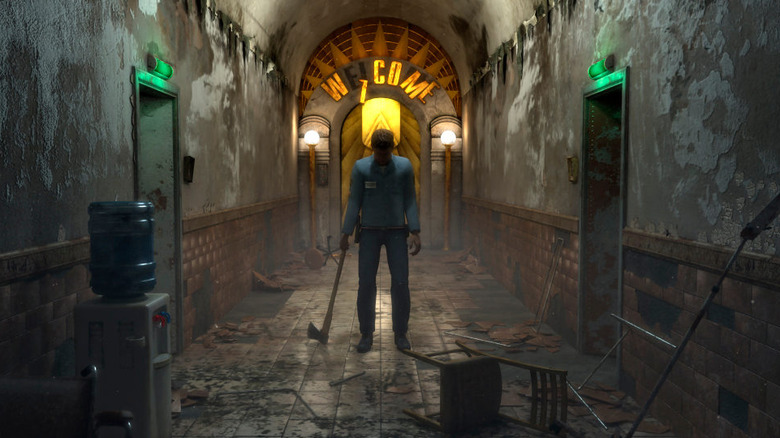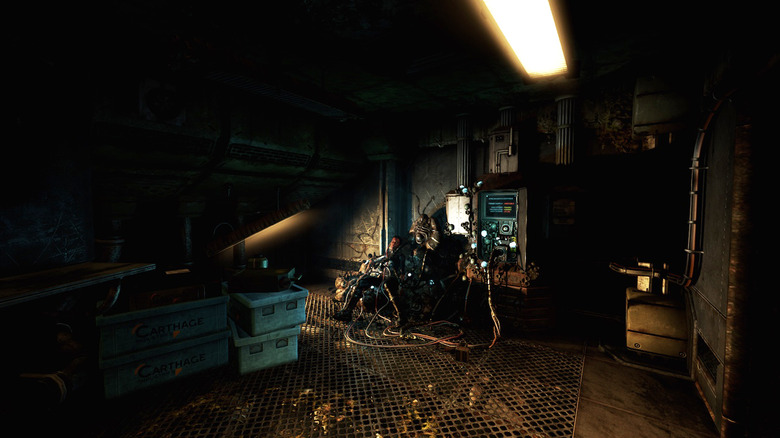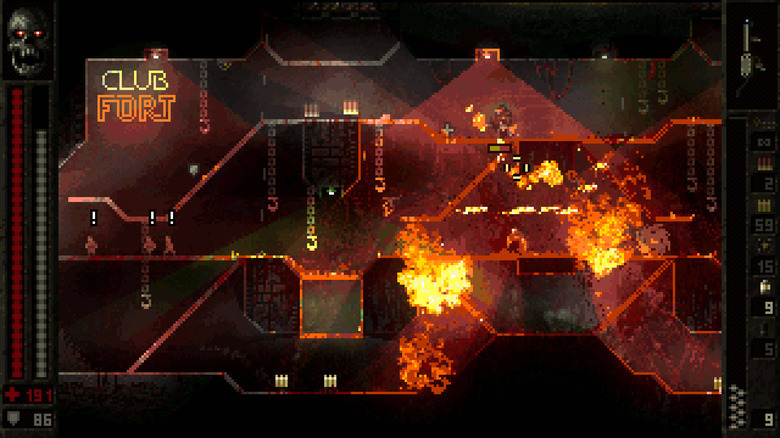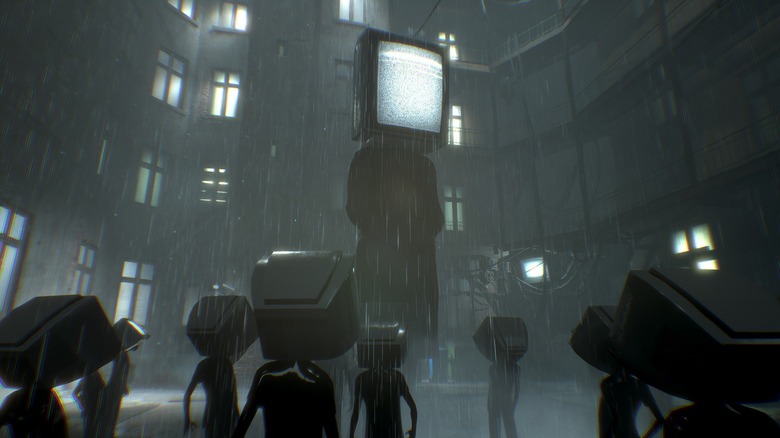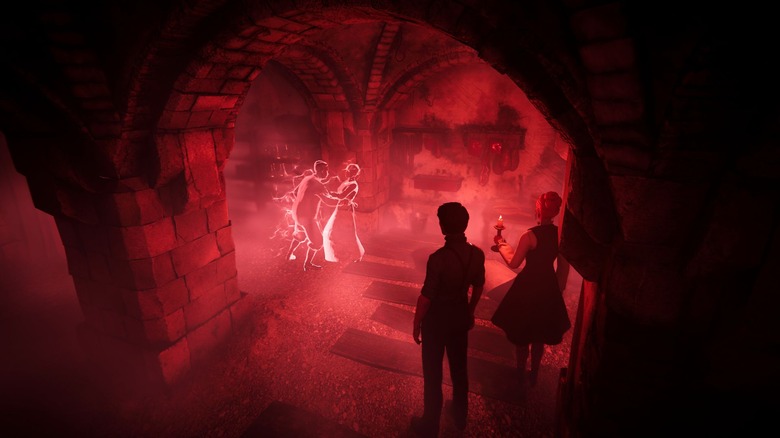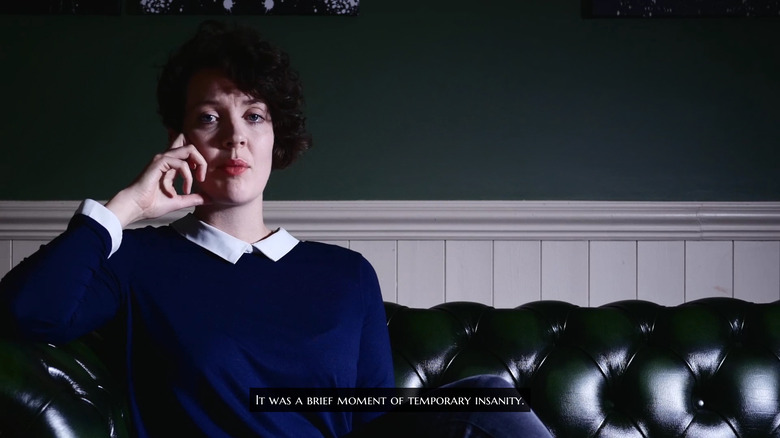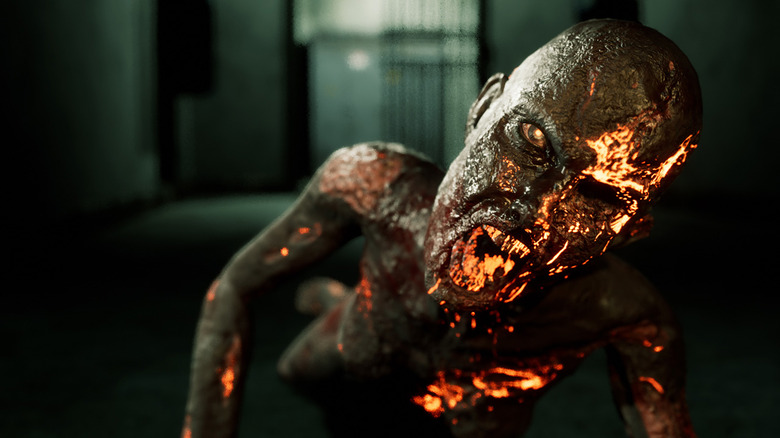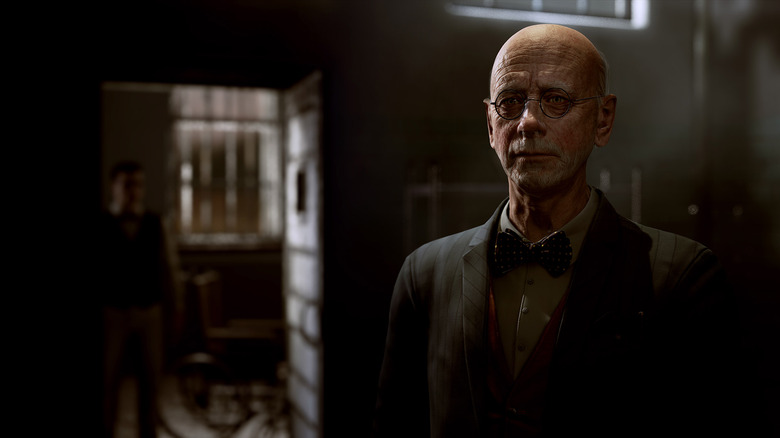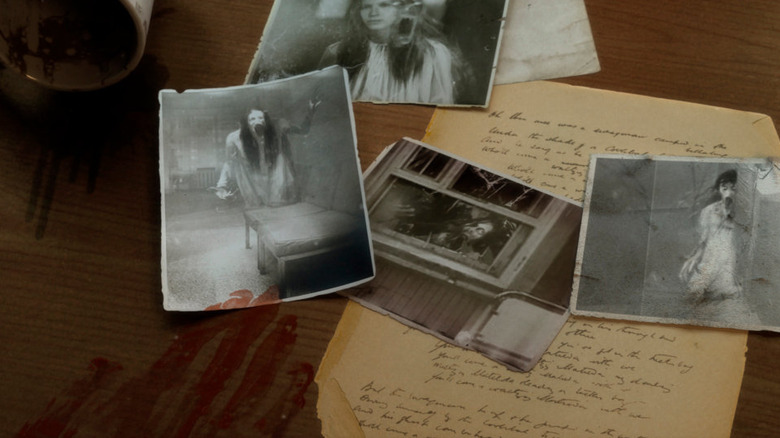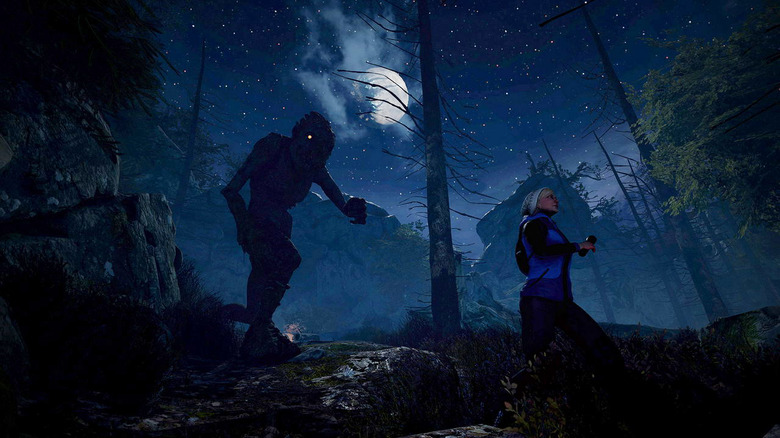The Darkest Games On The PlayStation Store
From console exclusives and popular ports, to PlayStation VR and beyond, the PlayStation Store's diverse offering of games often supports Sony's duly-appointed description of the PS4 as "the best place to play." But for every God of War and Uncharted on the market, there exist handfuls of lesser-known titles that are often overlooked. Many of these games that lurk among the shadows of blockbuster releases dwell in darkness, running the unsympathetic gamut of survival horror and hyper-violent action genres, while featuring narrative content of a distinctly mature nature.
Although grim game franchises like Silent Hill, Resident Evil and Manhunt helped define earlier generations of the Sony PlayStation, their spiritual successors (worthy or not) haven't always benefited from industry hype. Whether you fancy a neurotic first-person stroll through an insane asylum or the eradication of innocent humanity, the macabre corners of PSN have something for you. To celebrate this sinister subsect of the Church of PlayStation, we're taking a look at the darkest games on the PlayStation Store that nobody's talking about.
SOMA is a thoughtful masterpiece of sacrifice and identity
Among its many mysteries, SOMA raises a simple yet unanswerable question: "You know what sucks about dying?" Unanswerable, that is, until you've suffered through the terrible and intolerable isolation of futuristic underwater research facility PATHOS-II yourself. This sci-fi survival horror masterpiece from Swedish developer Frictional Games is a follow-up to their fan-favorite nightmare, Amnesia: The Dark Descent, and compels players to examine the very depths of existential madness. Frictional Games describes this 2015 release as "an unsettling story about identity, consciousness, and what it means to be human."
Players will awake within the subaquatic complex known as PATHOS-II, and must unravel the disconcerting tale behind protagonist Simon's tumultuous world as they explore the various stations of this clandestine facility. But it won't be easy: radio communication is out, food supplies are scarce, and the inscrutable, omnipresent Artificial Intelligence is going haywire. As you search for survivors and determine the fate of PATHOS-II, you'll have to survive yourself by outsmarting (or outrunning) insane enemies and indescribable lurking horrors.
Critical reception of SOMA was generally positive, with praise from outlets like IGN for its "engaging and surprising story" despite a "slightly less successful" implementation of survival horror gameplay. Kotaku called it a "nightmarish commentary on the possible future of humanity." But despite these accolades, the exceptionally inspired but slow-selling SOMA never quite reached the same level of prestige of its spiritual predecessor, Amnesia.
BUTCHER merges brutality with pixelation
If pixelated mayhem and red-soaked screens are your thing, then you may very well enjoy BUTCHER from publisher Crunching Koalas, a "small, but very ambitious" indie studio from Poland. Their mission statement of "patiently crafting cheerful digital entertainment" — while readily apparent in earlier titles like WordTrap Dungeon and MouseCraft — seems hilariously at odds with their self-proclaimed "blood-soaked love letter to the cult classics of the [action] genre."
This glorious 2D retro platform shooter from King Arthur's Gold developer Transhuman Design hit the PlayStation Network mid-2017, and — despite positive reactions from the likes of Doom creator John Romero — has been lurking beneath the surface of popularity ever since. Armed with chainsaws, shotguns, grenade launchers and everything in between, players will wreak cybernetic havoc screen-by-post-apocalyptic-screen on a mission to cleanse the Earth of "human vermin." But wait: there's more! "You have only one purpose: murder." It doesn't get much darker than that, folks. However, while similarly ultraviolent titles like Hatred have commanded the spotlight and a wide array of public attention, BUTCHER has merely skirted the edges of infamy.
Perhaps BUTCHER's engaging yet incongruous pixelated art is a contributing factor to the game's relative obscurity. Annihilating anything that moves never looked so cute. And as the official PlayStation Store page proudly proclaims: "If kicking corpses into a lava pit and adorning walls with blood is your idea of a good time, BUTCHER is THE game for you."
Observer is pure cyberpunk horror
If William Gibson and Philip K. Dick had a baby (and that baby just happened to be a video game), it would be Observer from Polish developer Bloober Team and American publisher Aspyr Media. This grim first-person cyberpunk adventure set in 2081 Krakow features Blade Runner's Rutger Hauer in the lead role of elite neural detective Daniel Lazarski — the titular Observer — who serves a corporate-funded police unit whose purpose is to hack and invade suspects' minds. After receiving a mysterious message from your estranged son, you'll brave the seedy Class C slums of Poland's second-largest city for a mind-hacking descent into madness as you uncover the truth.
Although Observer has been met with a healthy amount of critical praise — GameSpot calls it "a haunting and remarkable achievement" while Rock, Paper, Shotgun refers to Bloober Team's contribution to the genre a "masterclass in cyberpunk horror" — it hasn't yet claimed a foothold in the PlayStation fandom. The official description on the PlayStation Store proudly proclaims that "what you see will disturb you." Observer is a game that asks "How far will you go to discover the truth?", simultaneously enticing you to take step-after-step with its relentless barrage of breathtaking sci-fi visuals and harrowing moments of human angst.
Black Mirror is a modern take on another underrated jewel
Black Mirror from KING Art and THQ Nordic — not to be confused with the British sci-fi television series of the same name — is a third-person point-and-click style horror adventure and a reimagining of the classic gothic-horror series from Czech developer Future Games. In the tradition of the macabre tales of H.P. Lovecraft and Edgar Allan Poe, Black Mirror tells the story of protagonist David Gordon's inaugural visit to his ancestral home following the death of his enigmatic father. As players navigate the weird environs of Black Mirror Castle on a quest for knowledge, they'll "uncover the horrible truths, buried under generations of silence and fathoms of stone."
Critical reception of Black Mirror has been mixed and unforgiving, with outlets like the PlayStation-centric Push Square citing "poor controls, glitches, and frequent load times" while maintaining that the game's mystery "is absolutely one worth solving thanks to the captivating plot and engaging characters." Fans of gothic horror and weird tales will likely find a home in Black Mirror's eerie atmosphere and horrors of the mind. But, given the cult classic roots of the original trilogy from Future Games, it's unsurprising that this Black Mirror reboot from THQ Nordic would come to reside in similar obscurity.
The Infectious Madness of Doctor Dekker is a horror-mystery that can't be spoiled
In The Infectious Madness of Doctor Dekker from D'Avekki Studios and Wales Interactive, you play a psychiatrist tasked with solving the murder of the recently deceased Doctor Dekker. As you treat his patients, you'll have to sort out which of these suspects is the murderer (who is randomly chosen at the start of the game to thwart spoilers). The Infectious Madness of Doctor Dekker is a FMV murder mystery with a proud Lovecraftian influence, and actually holds the Guinness World Record for "The most Full Motion Video in a video game." This accolade is arguably low-hanging fruit, since the list of modern FMV titles on the PlayStation Network and beyond is relatively sparse.
Despite the title's creative side-stepping of "standard" video game elements like computer-generated imaging and animation, The Infectious Madness of Doctor Dekker lives up to its promise of Lovecraftian horror. Kotaku says this furtive FMV release "creeps in slowly, but once it's latched on, it drags you to the bottom and keeps you there." And with the replayability inherent in multiple endings featuring six main suspects and five side-quests, Doctor Dekker should continue to creep into the dark hearts of console players for many sessions to come.
Welcome to Hanwell infuses horror into every corner
This indie title from developer Nathan Seedhouse is a first-person open-world psychological horror game in the tradition of Condemned: Criminal Origins and Call of Cthulhu: Dark Corners of the Earth. Welcome to Hanwell allows players to explore a dense sandbox of terror, where every building is a unique location featuring it's own horrific story. Hints of open world titles like Silent Hill: Downpour decorate this grim small town setting; but, despite these aesthetic similarities to popular horror franchises with household names, Hanwell hasn't managed to catch the wider attention of genre enthusiasts. Yet.
Welcome to Hanwell's sprawling environment presents players with a healthy mix of exploration, puzzle solving, and combat with monstrous supernatural enemies known as "anomalies." These distinct encounters help define Hanwell's particular riff on the genre, which should satisfy any horror fiend's appetite for classic thrills and chills. Air Entertainment called Welcome to Hanwell "majorly ambitious ... a haunting and eerie experience that will stay with you long after you turn off your console." Hopefully, a few more critics and consumers alike will turn the console on to give this dark indie underdog a chance.
The Inpatient is a VR follow-up to a modern classic
Published directly from Sony Interactive Entertainment, The Inpatient is a first-person VR survival horror game from British developer Supermassive, set in Blackwood Sanatorium — the location of their 2016 BAFTA award-winning horror adventure Until Dawn. Players take on the role of an amnesiac inpatient challenged with rediscovering their identity and how they came to dwell in this troubled asylum in the first place. Featuring a branching narrative, an immersive story full of exploration-based flashback memories, and a fully realized body model for its Virtual Reality environment, The Inpatient rises to the challenge of not only providing an interesting prequel for the fan-favorite Until Dawn, but a grim stand-alone VR game experience.
Yet, as GamesRadar puts it: "with a playthrough only lasting around two hours, you might also be left asking why the heck you've paid ... for such a short experience" — until you realize that "it's actually a game that benefits from multiple playthroughs." Reviews for The Inpatient have been decidedly more mixed than those of its predecessor Until Dawn, which Game Informer cited as "a remarkable experience that horror fans shouldn't miss." Perhaps the critical dissonance and relative silence around The Inpatient can be attributable to its nature as a VR release in a world that's still hanging onto handhelds and controllers — but it's certainly got the scares we're looking for.
True Fear: Forsaken Souls brings puzzle gaming into dark territory
This point-and-click horror adventure from indie developer Goblinz and publisher Digital Lounge challenges players to a mind-bending mystery escape game unlike anything else you'll find on the PlayStation Store. True Fear: Forsaken Souls – Part 1 is the first in a trilogy that promises "an intense adventure brimming with psychological suspense in a plot filled with twists and turns." Although True Fear's graphic stylings feel relatively simple compared to other games on our list of dark favorites, the ambience and exceptional attention to detail are what set it apart. Whether you're picking rusty locks, solving arcane puzzles, or fishing spoonfuls of dirty nails out of pots of boiling water, True Fear: Forsaken Souls – Part 1 presents a wide array of satisfying genre tropes and freshly surprising revelations among its many enigmas.
Critical coverage of this genre-bending title, however, remains sparse. Amidst the relative industry silence, DarkStation asserted a measure of positivity and precaution, maintaining that True Fear is a "solid addition to the hidden object genre with a horror twist to it," but "if you're just a horror fan though, you may find the constant stream of puzzles to be annoying." Ultimately, if you don't mind a thin narrative, True Fear offers a delightful jaunt to the darker corner of PSN.
Through the Woods is a modern spin on Norse folklore
"Something terrible happened there. But a long time ago." Through the Woods from Norwegian developer Antagonist and European publisher 1C Publishing is a third-person Norse horror adventure that came to life via Kickstarter in 2016, two years before making its way to the PlayStation Network in 2018. With obvious hints of Remedy Entertainment's Alan Wake in its themes and execution, Through the Woods uses reactive narration to tell the story of a mother on her quest to find her missing son in a folk tale-inspired forest on the western shores of Norway. As you combat the fear and mystery that comes from roaming through this mythological wilderness, the only thing you'll have to your advantage against the terror and the trolls is the claustrophobic cone of a flashlight.
While critical reviews of the original PC release were somewhat favorable — CG Magazine, for instance, called it "a sad, haunting tale that manages to scare without being cheap or easy, and one of [2016's] best horror games" — professional assessment of the PlayStation port is distinctly lacking. Playstation Official Magazine UK (the only outlet aggregated to Metacritic for the PSN release) called Through the Woods "a half-baked novelty. One for the curious but certainly not the powerful story that it could have been." As a result, this "profound experience" of "loneliness and loss" from Antagonist hasn't had a good chance to shine for the horror-hungry PlayStation audience.

